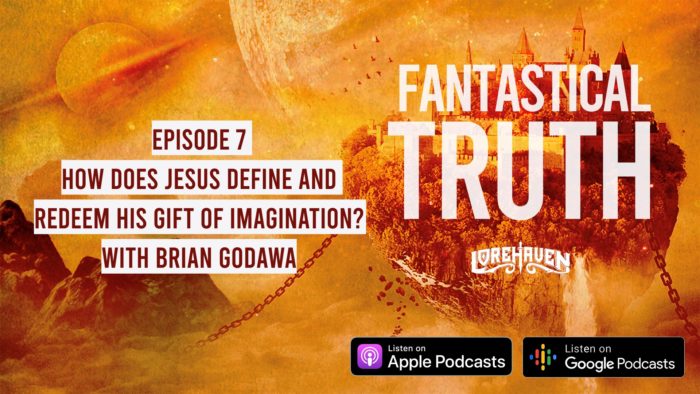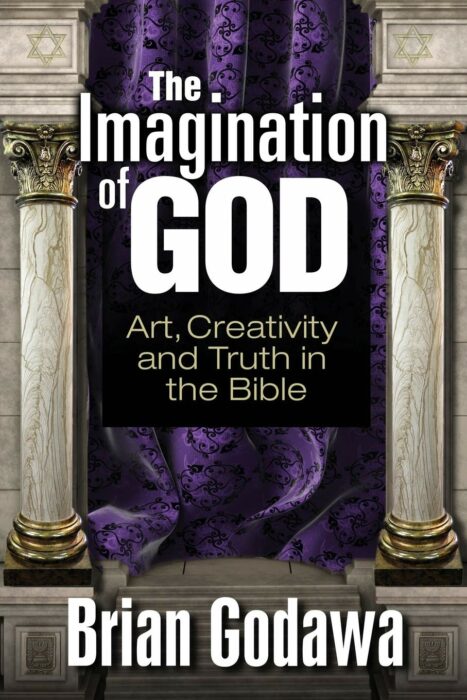7. How Does Jesus Define and Redeem His Gift of Imagination? | with Brian Godawa
Podcast: Play in new window | Download (Duration: 1:18:59 — 73.7MB) | Embed
Behold the not-shortest episode of Fantastical Truth. This time we delve into the deep-doctrine magic of God’s gift of human imagination.
This time we’re joined by biblical/supernatural novelist and nonfiction author Brian Godawa.
Brian writes books like these:
- Jezebel: Harlot Queen of Israel (newest)
- The Imagination of God (formerly titled Word Pictures)
- God Against the Gods: Storytelling, Imagination and Apologetics in the Bible
- Hollywood Worldviews: Watching Films with Wisdom and Discernment
We make these topic concessions:
- We can’t go into the entire “graven images” issue here (e.g. what do we do with pictures of Jesus in movies, coloring pages). Another time, perhaps.
- We also can’t address every historical instance of Christians idolizing images.
- We can’t deal with the issue of different personalities. God has gifted some of his people with (colloquially) “left brain” gifts, so they can be engineers or programmers or even theologians skilled in translating/exegeting words. And he’s gifted others with more “right brain” gifts. Side effect of either: hardship understanding the other type of person, or even wrongly judging them.
Zack quotes Emily Dickinson’s poem:
Tell all the truth but tell it slant —
Success in Circuit lies
Too bright for our infirm Delight
The Truth’s superb surprise
As Lightning to the Children eased
With explanation kind
The Truth must dazzle gradually
Or every man be blind

We explore imagination across the gospel narrative:
1. Creation.
We have to go back to Genesis to learn how God created humans.
The idea of “image” is right there at the start because we ourselves are “images” of God. Little finite reflections of the almighty Creator? It sounds absurd (and some folks called Gnostics indeed think it’s very unspiritual).
Humans made in God’s image, the imago Dei, was God’s idea. Humans “image” or reflect God back to him.
This is solid theology. God wants to see reflections of himself because we reflect back his glory. God is all about maximizing his name/glory in universe.
How do we reflect God? By behaving as he does. By reflecting back his character and qualities. First thing God commands is not “be holy” or “be loving” like I am. (That comes later.) His first command: be fruitful, multiply, steward creation, use what I’ve created to make things of your own.
These include images. And written language.
2. Fall
Sin comes into the world. We must acknowledge this. All our culture-making and image-bearing is now marred by rebellion against our Creator.
But culture-making continues. People make instruments, and likely also images of things. Fast-forwarding past Flood, Babel, Abraham, patriarchs, Exodus: God calls out his covenant people and gives them moral commands.
3a. Redemption, Old Testament
Then God gets to work commanding his people to make images, such as in the Tabernacle and with Bezalel.
Also we read about the Passover, one of the most incredible acted-out images in all Scripture. This practice lasted generations in Israel until Jesus came thousands of years later to fulfill it. Without this image (described to us in words), we wouldn’t have the expectation of Jesus, and the knowledge (after the fact) that all of this realized imagination was meant all along to point to Jesus the fulfillment.
3b. Redemption, New Testament
Now that Jesus has completed God’s mission of salvation, we start to recover a worshipful, Jesus-centered vision of God’s gifts, including imagination. We can enjoy this gift in ways that help us draw closer to the God who gave them.
Still, images are powerful. God uses them alongside rationality. (Example: Jesus taught in parables of images, and didactic teaching.)
But apart from rationality, images can become dangerous and idolatrous.
Solution: Always, always remember your created purpose. You are created to be an image, a reflection, of God your Creator. And in a world full of broken images, if you are a Christian, you have also been redeemed by Jesus. He is the image of the invisible God (Colossians 1:15) and “Just as we have borne the image of the man of dust, we shall also bear the image of the man of heaven” (1 Corinthians 15:49). When we bear his image, we start to see all other images people have made in perspective. We can start to reject idols and redeem good images.
This includes sharing stories that glorify God by marrying, not divorcing, the two gifts he’s given us: rationality in written language and precision, and imagination with creative picture-making. These two “realms” will be brought together.
4. Restoration
It’s only after Jesus renews all of planet Earth, and the whole cosmos, that we have God’s gift of imagination fully restored to us.
We’ll see no more idolatry of imagination or the things people make.
We’ll have no more tensions between being creative and doing whatever we can to put food on the table.
And we’ll no longer suffer pain or crying or sickness or death, which can really interrupt that creative output.
Instead, Jesus will restore his people so they will be fit to live in his restored universe, the New Heavens and New Earth, forever.
We reference these books and articles:
- The Frances A. Schaeffer trilogy
- John Walton’s Genesis 1 as Ancient Cosmology
- J. R. R. Tolkien’s essay “On Fairy-Stories”
- Joe Carter’s article “Thomas Kincaid’s Cottage Fantasy”
Next on Fantastical Truth:
We originally promised an episode about Frank E. Peretti’s This Present Darkness. But first, a word from our biggest news of 2020. We share a few “favorite” pandemic stories, including the recent Planet of the Apes film trilogy and Tosca Lee’s 2019 novel The Line Between. How can pandemic fiction help us seek God’s strength in scary times?1
- Original text:
This month we’re releasing our next Lorehaven issue. Its cover story explores our favorite Christian-made fantastical novels. This includes that classic of the 1980s, Frank Peretti’s This Present Darkness, a classic (especially for Christians!) supernatural thriller that asks: What If the Armies of Hell Tried to Invade Your Hometown? Lorehaven’s review chief, Austin Gunderson, will join the podcast to explore the Peretti-verse with us. ↩






























[…] Behold another Fantastical Truth podcast episode. This one is chock-full of deep-magic goodness about God’s gift of human imagination. […]
[…] course, episode 7, How Does Jesus Define and Redeem His Gift of Imagination? | with Brian Godawa, released this […]
I believe in the preterist view of eschatology, that most, if not all, of biblical prophecy is fulfilled, and that Jesus has already returned to judge Israel and to destroy Jerusalem and its Temple. Thank you Lorehaven for all you do. Brian Godawa’s books are beautifully written with imagination and biblical truth which I recommend to all mature audiences. God bless you guys.